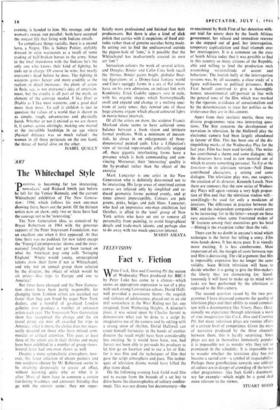Fact v. Fiction TELEVISION W ITH Cock, Hen and Courting Pit
the season of Wednesday Plays produced for BBC-1 by Peter Luke has come to a climax—which seems an appropriate expression to use of a play with such strong Lawrentian echoes. David Halli- well provided a passionate theme—the anguish and violence of adolescence, played out in an old mill somewhere in the West Riding not far, one imagined, from Wuthering Heights. A director's piece, it was seized upon by Charles Jarrott to demonstrate what can be done to a script by imaginative use of •the camera and by editing with a strong sense of rhythm. David Halliwell can count himself fortunate; in the hands of another director the result might have been considerably less exciting. So it would have been, too, had Jarrott not been able to persuade his producer to let him go on location and to use a lot of film; for it was film and the techniques of film that gave the script atmosphere and pace. The techni- ques of television drama would have killed the play stone dead.
On the following evening Jack Gold used film not to escape from the bounds of a set but to drive home the claustrophobia of solitary confine- ment. This was not drama but documentary—the re-enactment by Ruth First of her detention with- out trial for ninety days by the South African government, her release and immediate rearrest as she stepped out of gaol, her interrogation, temporary capitaulation and final triumph over her interrogators. It is a comment on the state of South Africa today that it was possible to find in this country so many citizens of the Republic able and willing to lend the production such astonishing verisimilitude of accent and behaviour. The loutish bully at the interrogation sessions was, by all accounts, a close study of a figure well-known to political prisoners. Ruth First herself contrived to give a thoroughly honest, unsentimental self-portrait in line with the general tone of the film, which was marked by the rigorous avoidance of sensationalism and by the determination to treat her politics as the irrelevance they are in this context.
Apart from their intrinsic merits, these very diverse programmes raise two interesting ques- tions. The first concerns the development of narration in television. In the Halliwell play the electronic camera had been largely abandoned in favour of film. This has been one of the dis- tinguishing marks of the Wednesday Play for the last year. Film has been used lavishly. The writer has contributed a theme and some dialogue; this the directors have used as raw material out of which to create something personal. To Up at the Junction—in its television version—Nell Dunn contributed characters, a setting and some dialogue. The television play was, one suspects. the creation of its director, Kenneth Loach. Now there are rumours that the new series of Wednes- day Plays will again contain a very high propor- tion of film and that the television studios unwillingly—be used for only a modicum of interiors. The difference in practice between the BBC and the independent companies would seem to be increasing; for in the latter—except on those rare occasions when some frustrated maker of 'B' features among their executives gets his head —filming is the exception rather than the rule.
There can be no doubt in anyone's mind which technique is the better for telling a story. Film wins hands down. It has mare pace. It is visually more exciting. It is less cumbersome. Most important of all, the margin of costs between, tape and film is decreasing. The cld argument that film is impossibly expensive has no longer the same validity. Soon British television will have,. to decide whether it is going to give the film-makers the liberty they are clamouring for. Simul- taneously it will have to make up its mind what tasks are best performed by the television as opposed to the film camera.
The second question raised by the two pro- grammes I have discussed concerns the quality of television plays and their ability to stand compari- son with a documentary like Ninety Days. Occa- sionally we experience through television a work of true imagination like Cock, Hen and Courting Pit; but many television plays are routine affairs of a certain level of competence. Given the mass of narrative produced by the three channels between them, this is hardly surprising. Since plays are not in themselves immensely popular it is impossible not to wonder why they,are' so prominent in the schedules. It is impossible'not to wonder whether the television play bag- not become a sacred cow—a symbol of respectability. Perhaps these genuflections towards one Cbhkept of culture are in danger of crowding off the:kereen other programmes—like Jack Gold's dociinent- ary for example—which might be a gond deal more relevant to the viewer.






























 Previous page
Previous page